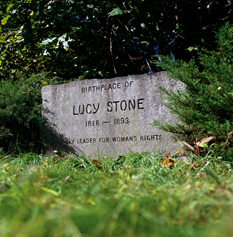


 |
Issue Contents :: Feature :: Lucy Stone: Lost and Found :: Page [ 1 2 3 ]
Lucy Stone Lost and Found
America's most influential women's rights advocate finally takes her place in history.
 Charlie Wyman '75 politely sweeps back stray branches as we walk along a short footpath to an old farmhouse foundation in West Brookfield, Massachusetts. Poison ivy plants hover beside the trail like landmines of itch. We reach the edge of the cellar hole and peer in. It's nearly 10 feet down to the dirt floor, deeper and wider than most of the thousands of holes that pock New England forests. The cellar's walls are massive fieldstones sitting purposefully one atop another, an artistic testament to muscle and sweat. An old rusted furnace slumps in one corner, pieces of pottery poke up from the dirt, and trees as thick as hockey players' legs have grown up where floorboards once spanned the gap. A canopy of hardwoods drenches us in darkness. Beyond the veil of leaves, a hot, dry September sun floods the landscape with light.
Charlie Wyman '75 politely sweeps back stray branches as we walk along a short footpath to an old farmhouse foundation in West Brookfield, Massachusetts. Poison ivy plants hover beside the trail like landmines of itch. We reach the edge of the cellar hole and peer in. It's nearly 10 feet down to the dirt floor, deeper and wider than most of the thousands of holes that pock New England forests. The cellar's walls are massive fieldstones sitting purposefully one atop another, an artistic testament to muscle and sweat. An old rusted furnace slumps in one corner, pieces of pottery poke up from the dirt, and trees as thick as hockey players' legs have grown up where floorboards once spanned the gap. A canopy of hardwoods drenches us in darkness. Beyond the veil of leaves, a hot, dry September sun floods the landscape with light.
Wyman orchestrated the purchase and protection of this humble hole on behalf of the Trustees of Reservations, a Massachusetts-based land trust. We trace its perimeter in cool silence. New Englanders are used to coming upon abandoned cellar holes. They spark in us passing wonder (Who once lived here? What was their story?) as we go about our business of berry picking or snowshoeing. But this cellar hole has a story too important to ignore, a story of a nation coming of age and how it learned to embrace every citizen, be they a white woman or a black man. But to find this story, one must see beyond the impudent saplings and earthenware shards and gaze deep into the blue-gray eyes of Lucy Stone, Oberlin Class of 1847: "suffragist, human rights advocate, and one who once called this place home.
In the age of hyphenated surnames, stay-at-home dads, and multinational media mavens, it's difficult to imagine a time when American women had no rights. Just over 100 years ago, women signed away their individual legal identities when they married, and they didn't have the right to vote. Fathers, sons, and brothers heartily discouraged girls and women from seeking an education.
Lucy Stone was born in 1818 and raised on the family farm on Coy's Hill in West Brookfield. Hers was a hardscrabble existence punctuated with cold, dark winters; long days of physical labor; a mother enslaved by farm chores; and a father whose taste for hard cider could turn him as mean as a barn cat in the blink of an eye. But there was beauty too: a sweeping view of the valley from the hilltop, a pack of close-knit siblings, and ample fresh food and clean air. On the surface, the Stones were unremarkable, the spitting image of every other family that had carved a life out of the rocky New England soil.
But Lucy Stone was different. She was faster at learning than her brothers and couldn't understand why they were to be educated but she was not. Upon hearing quotes from the Bible outlining the proper roles of men and women, she vowed to learn Greek and Hebrew so she could correct what must surely have been a mistranslation. She so ached for an education that she spent nine years toiling between teaching and studying to pay for her schooling, first at Mount Holyoke Seminary and then at Oberlin, the only college open to women and blacks at the time. She graduated from Oberlin in 1847, becoming one of the first women from Massachusetts to earn a bachelor's degree.
Next Page >>